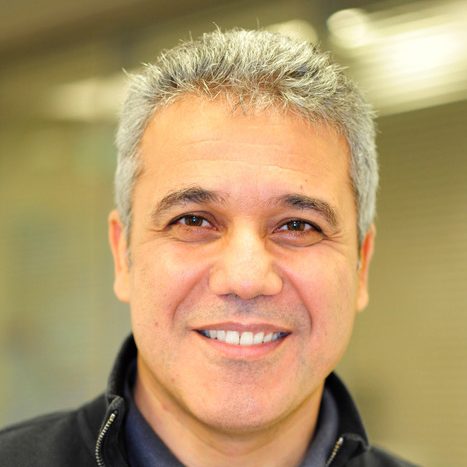Date and time: 13 May 2024, 10:00-11:00 CEST
Speaker: Prof. Dr. Huseyin Arslan, Istanbul Medipol University
Title: 6G Waveform Options
Where: Amiga Conference Room, Electrum, Kista
Zoom: https://kth-se.zoom.us/j/69560887455
Meeting ID: 695 6088 7455
Moderator: Cicek Cavdar
Administrator: Alva Kosasih
 Abstract: Today’s wireless services and systems have come a long way since the rollout of the conventional voice-centric cellular systems. While 4G indicated that the evolution of cellular systems was directed more towards broadband connectivity than voice communications, 5G promised a paradigm shift with promising applications such as massive machine-type connectivity and ultra-reliable low-latency communication for a variety of use cases, including Industry 4.0 and Internet of things (IoT). This trend of increasing heterogeneity in terms of use cases and applications is bound to continue with the next-generation networks with even more stringent requirements related to cost, power efficiency, spectrum efficiency, extreme reliability, low latency, robustness against diverse channel conditions, cooperative networking capability and coexistence, dynamic and flexible utilization of wireless spectrum.
Abstract: Today’s wireless services and systems have come a long way since the rollout of the conventional voice-centric cellular systems. While 4G indicated that the evolution of cellular systems was directed more towards broadband connectivity than voice communications, 5G promised a paradigm shift with promising applications such as massive machine-type connectivity and ultra-reliable low-latency communication for a variety of use cases, including Industry 4.0 and Internet of things (IoT). This trend of increasing heterogeneity in terms of use cases and applications is bound to continue with the next-generation networks with even more stringent requirements related to cost, power efficiency, spectrum efficiency, extreme reliability, low latency, robustness against diverse channel conditions, cooperative networking capability and coexistence, dynamic and flexible utilization of wireless spectrum.
Given that wireless connectivity is becoming an imperative part of our existence, not just from the communication but also sensing perspective, it is important for the enabling technologies to keep up with the ever increasing requirements. Consequently, 6G envisions a network empowered with intelligent, aware, and flexible technologies that can scale with the various use cases, applications, and deployment scenarios. The emergence of software-defined networks allows the automatic configuration of devices and their parameters, systems, and services according to the user’s context. Some of the more-popular technologies in this regard include integrated sensing and communication, non-terrestrial networks, non-orthogonal techniques for increased efficiency, higher frequency bands (mmWave and THz), smart radio environments etc.
A fundamental part of any wireless communication standard is the PHY/MAC design. In this regard, the current OFDM technology has enjoyed unprecedented success with it being the only waveform being used for multiple generations of cellular systems (albeit with the introduction of multiple numerologies). However, given its limitations in terms of satisfying the new requirements, it is high time to look at potential alternatives for 6G PHY. Accordingly, in this presentation, we will identify the waveform design criteria for the upcoming 6G standards. The potential directions and research opportunities to address the challenges and requirements of the 6G vision will be discussed.
Bio: Dr. Arslan (IEEE Fellow, NAI Fellow, Member of Turkish Academy of Science) received his BS degree from the Middle East Technical University (METU), Ankara, Turkey in 1992; his MS and Ph.D. degrees were received respectively in 1994 and 1998 from Southern Methodist University (SMU), Dallas, TX. From January 1998 to August 2002, he was with the research group of Ericsson, where he was involved with several projects related to 2G and 3G wireless communication systems. Between August 2002 and August 2022, he was with the Electrical Engineering Department, at the University of South Florida, where he was a Professor. In December 2013, he joined Istanbul Medipol University to found the Engineering College, where he has been working as the Dean of the School of Engineering and Natural Sciences. In addition, he has worked as a part-time consultant for various companies and institutions including Anritsu Company, Savronik Inc., and The Scientific and Technological Research Council of Turkey. Dr. Arslan served as the founding Chairman of The Board Of Directors of ULAK Communication company, which is the Turkish telecom equipment provider. He was also the member of the Tubitak Scientific Board. Since May 2021, he is serving as a Member of the Board of Directors for Turkcell, the biggest cellular operator in Turkey while also operating in Ukrain, Belarus, and Cyprus.
Dr. Arslan conducts research in wireless systems, with emphasis on the physical and medium access layers of communications. His current research interests are on 6G and beyond radio access technologies, physical layer security, interference management (avoidance, awareness, and cancellation), cognitive radio, multi-carrier wireless technologies (beyond OFDM), dynamic spectrum access, co-existence issues, non-terrestial communications (High Altitude Platforms), joint radar (sensing) and communication designs. Dr. Arslan has been collaborating extensively with key national and international industrial partners and his research has generated significant interest in companies such as InterDigital, Anritsu, NTT DoCoMo, Raytheon, Honeywell, Aselsan, Vestel,Türkcell, Keysight technologies. Collaborations and feedback from industry partners has significantly influenced his research. In addition to his research activities, Dr. Arslan has also contributed to wireless communication education. He has integrated the outcomes of his research into education which lead him to develop a number of courses at the University of South Florida and Istanbul Medipol University.
He has developed a unique “Wireless Systems Laboratory” course (funded by the National Science Foundation and Keysight technologies) where he was able to teach not only the theory but also the practical aspects of wireless communication system with the most contemporary test and measurement equipment. Dr. Arslan has served as general chair, technical program committee chair, session and symposium organizer, workshop chair, and technical program committee member in several IEEE conferences. He is currently a member of the editorial board for the IEEE Surveys and Tutorials and the Sensors Journal. He has also served as a member of the editorial board for the IEEE Transactions on Communications, the IEEE Transactions on Cognitive Communications and Networking (TCCN), and several other scholarly journals by Elsevier, Hindawi, and Wiley Publishing.





